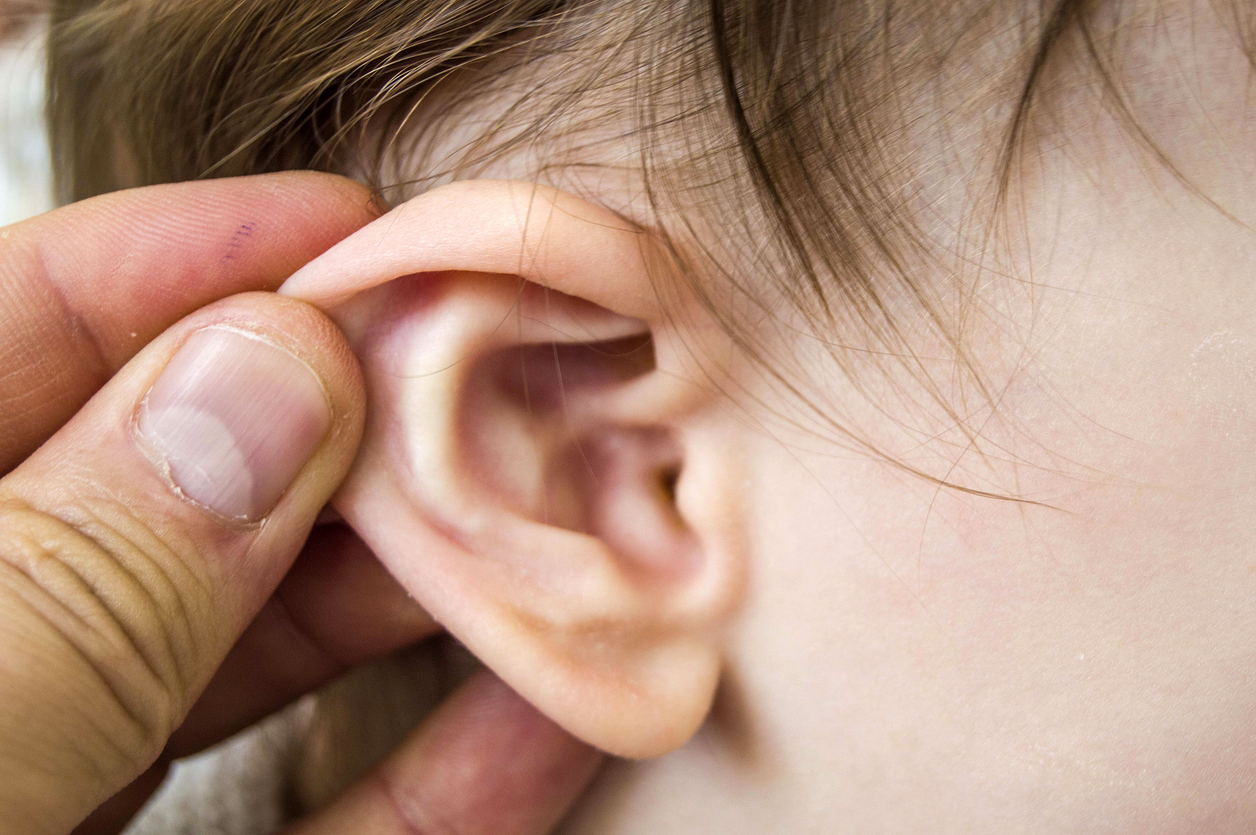More than 80% of children have an ear infection by age 3. While ear infections can be painful, they typically resolve in a few days.
As a parent or caregiver, you want to do what you can to keep your child comfortable when they experience an ear infection and may wonder if antibiotic treatment is necessary to speed up the healing process. Keep reading to learn about the different types and causes of ear infections, and whether antibiotic treatment is necessary.
Key Takeaways:
- Middle ear infections can be caused by both viruses and bacteria
- Watchful waiting is typically how a doctor determines if prescription medication is necessary for your child's ear infection
- Only bacterial infections require antibiotic therapy; viral ear infections resolve on their own, but over-the-counter pain relievers and home remedies can help
What is a middle ear infection?

A middle ear infection (otitis media) occurs when fluid accumulates in the middle ear and becomes infected by viruses or bacteria, leading to pain and discomfort. This condition primarily affects young children because their eustachian tubes (the tubes that drain fluid from the middle ear) are small and positioned so they don’t drain well. Also, their immune systems are still developing.
Typical ear infection symptoms can include one or more of the following:
- Fever
- Ear pain
- Tugging at the ear
- Reduced appetite
- Crankiness or irritability
- Trouble sleeping
- Ear drainage (which may be clear, yellow, bloody, or pus-filled)
There are different classifications of ear infections. Another type of ear infection is Swimmer's ear (otitis externa). This occurs when the skin on the outer ear canal becomes infected due to moisture and changes in pH, usually after swimming. This requires antibiotic/steroid ear drops to treat.
In some cases, children can experience chronic suppurative otitis media (or chronic otitis media), which are recurrent infections of the middle ear.
What causes middle ear infections?
MIddle ear infections often follow a child's cold, as fluid in the middle ear becomes infected by a virus, bacteria, or a mix of both. The primary virus behind ear infections is the rhinovirus, known for causing the common cold. The leading bacteria culprits are Streptococcus pneumoniae and Haemophilus influenzae (nontypeable). Other potential risk factors for young children include allergies, exposure to secondhand smoke, and frequent upper respiratory infections.
How do I know if my child's ear infection is viral or bacterial?
For milder cases, your child's doctor will want to watch and wait to see if the infection clears. Most ear infections (up to 85%) result from a virus and clear on their own in a few days; however, if the infection does not clear in 2-3 days, your child experiences severe ear pain not relieved by ibuprofen and/or Tylenol, or high fever above 101, your doctor may determine that the infection results from bacteria and prescribe antibiotics.
<div fs-richtext-component="cta" class="content_cta">
<div class="content-cta__title">
<div class="y-tex-xxs text-color-white">
Blueberry - Rated best for online pediatrics!
</div>
</div>
<div class="y-text-2xl text-color-white">
👩🏽⚕️ Chat With A Pediatrician About Your Child's Ear Pain
</div>
<a href="https://app.blueberrypediatrics.com/join_blueberry_18a_cart?promo=blog100"
target="_blank" class="content-cta_btn w-button">
Get Started
</a>
<link rel="prefetch" href="https://app.blueberrypediatrics.com/join_blueberry_18a_cart?promo=blog100">
Do viral ear infections require antibiotics?
Ear infections resulting from a virus do not need antibiotic treatment because antibiotics are only used to treat bacterial infections. A viral ear infection will usually clear up within 2-3 days.
Note: taking antibiotics for viral infections can cause antibiotic-resistant bacteria - which makes antibiotics less effective for future bacterial infections.
How do I treat my child's viral ear infection?
You can help lessen your child's pain by applying warm compresses to their ears and giving them over-the-counter pain relief medication.
Do bacterial ear infections require antibiotics?
Ear infections resulting from bacteria require antibiotic medication. If your child does not take antibiotics, not only will their uncomfortable symptoms persist, but there is also a risk of more severe conditions, such as spread of the infection to the mastoid which is a space between the ear and the brain.
Which antibiotics treat ear infections?
If your child's middle ear infection is determined to be caused by bacteria, their pediatrician will likely prescribe an oral antibiotic, depending on the type of ear infection and their medical history.
Oral antibiotics typically prescribed for ear infections include:
- Amoxicillin
- Amoxiciilin-clavulonic acid (Augmentin)
- Cefdinir (Omnicef)
There are also topical antibiotics (ear drops) for ear infections. These are typically prescribed for an outer ear infection (Swimmer’s ear).
How can ear infections be prevented?

Preventing ear infections can be challenging, but some steps can help reduce the risk:
- Keeping up with vaccinations
- Avoiding exposure to secondhand smoke
- Practicing good hygiene by washing hands frequently
Additionally, breastfeeding can decrease the likelihood of ear infections in infants. If your child is prone to frequent ear infections, talk to your doctor about potential preventive measures.
Where can I find additional information about ear infections?
If you suspect your child has an ear infection, you can connect with a board-certified pediatrician anytime through Blueberry Pediatrics.
Blueberry Pediatrics, one of the largest pediatric practices in the US, offers 24/7, on-demand care for children ages 0-21. With their virtual platform, parents can receive a diagnosis and treatment plan (including antibiotics if necessary) for their child's ear infection without leaving the comfort of their home. This saves time and money and reduces potential exposure to other illnesses in a doctor's waiting room.
Need to see a pediatrician immediately? We've got you covered! Chat with a pediatrician just minutes after you sign up.
.png)
Frequently Asked Questions
Why are children more likely than adults to get ear infections?
Children are born with an immune system that hasn’t seen any infections before, so they are more likely to be ill from any infection their body comes across. Once the body “sees” an infection, it builds immunity and prevents the body from being so sick (or sick at all) the next time it is exposed.
Adults have lots of immunity from all the viruses they have seen in their lifetime; kids have to build this immunity by fighting illness. Luckily, most illnesses are mild, but middle ear infections are much more likely to happen due to colds (viral upper respiratory infections), and children can get 1-2 a month for the first few years of their life.
Also, the eustachian tube connects the middle ear to the throat and should help drain fluid and equalize the pressure in the ear. In children, especially under 3, the tube is narrow and not angled so that it drains well. As kids grow, the tube gets wider and tips to allow better drainage.
Can I prevent ear infections?
While ear infections can't be entirely prevented, you can reduce risk factors by staying updated on vaccines, frequent hand washing, avoiding exposure to cigarette smoke, and frequent hand washing. Additionally, parents should not put their baby down to sleep with a bottle, and they should limit their child's exposure to other sick children.
What happens if my child keeps getting ear infections?
Despite your best preventive efforts, your child may still face recurring ear infections. In such instances, your pediatrician might recommend a consultation with an ear, nose, and throat (ENT) specialist. These experts can assess your child's condition and administer suitable treatments to lessen the chances of recurrent ear infections.
The ENT specialist may propose a tympanostomy tube insertion procedure for your child. This procedure involves the surgical placement of small tubes in your child's eardrums to prevent fluid accumulation and enhance airflow in the middle ear.
Why won't my child's doctor prescribe antibiotics for a viral ear infection?
Viruses are not affected by antibiotics, so prescribing antibiotics will not help your child get better faster. If your child is exposed unnecessarily to antibiotics, this increases resistance to that antibiotic and makes it less likely to work when they actually need it for a bacterial infection.
What are the different types of ear infections?
An inner ear infection (otitis media or acute otitis media) is the most common infection type. If there is long-lasting inflammation of the middle ear, the condition is called chronic otitis media (long-lasting inflammation of the middle ear).
Swimmer's ear typically results from water activities, such as swimming, and occurs when moisture causes bacteria to grow on the outer ear canal.
Additionally, there is a condition called otitis media with effusion. This is not an infection and occurs when there is fluid buildup in the middle ear without signs or symptoms of an ear infection.
What's the best antibiotic for ear infections?
Your child's pediatrician will determine the best antibiotic for their ear infection based on factors like their symptoms and health history.






.avif)
%20.avif)
.svg)






.svg)
.svg)